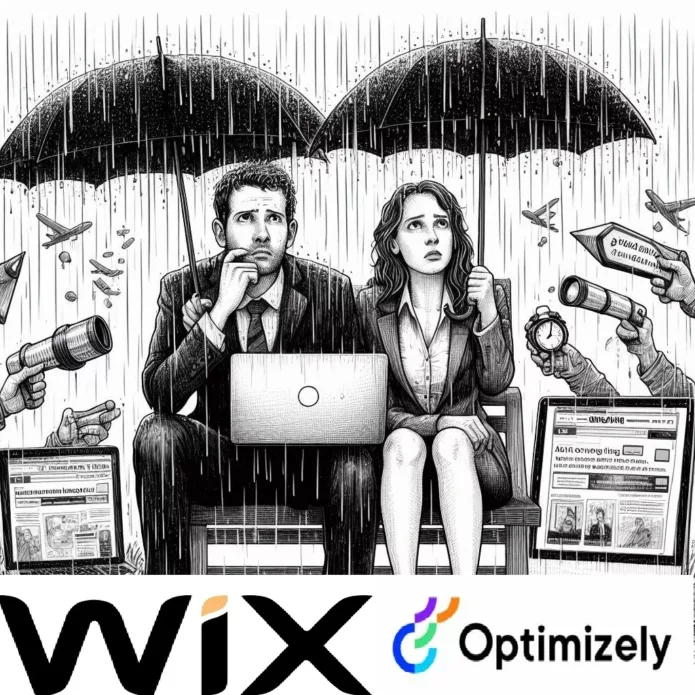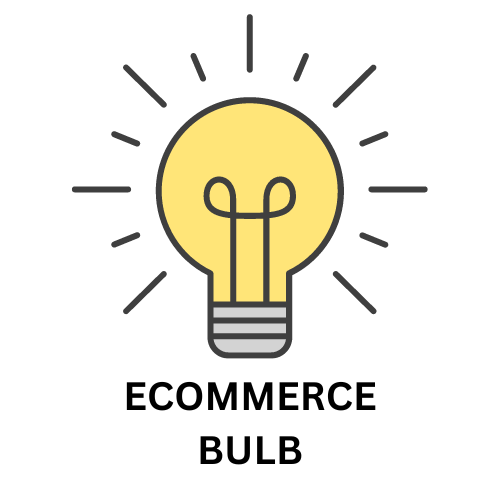In order to decide which ecommerce platform to use, WiX vs Optimizely. A detailed comparison between features must be thoroughly done. If you want to decide which eCommerce platform to choose, there are many things to consider.
These are some examples of these factors:
- Cost.
- SEO friendliness.
- Page load speed.
- Canonical website URL.
- Indexing Control.
- Customizable HTML capabilities.
- Sitemap Generator.
- Integration with Google Analytics.
- Product Tagging and Categorization.
- Batch Uploading.
- Mobile Optimization.
- Built-in Blogging and Marketing Features.
- Social Sharing Buttons.
- Content Management Capabilities.
- Discount and promotion code tools.
- Easy to use Checkout.
- Reporting tools and custom reports.
- Integration of email marketing tools.
- Multiple payment options.
- Flexibility to add new eCommerce features.
- Exclusive features.
- Cons and pros.
Here we’ll discuss these factors to help you decide which platform is better for you, Optimizely or WiX. And at the end of the discussion, we’ll recap and make a comparison for the scores of all these points to find out which eCommerce platform has the higher score, so that you’ll have a good view about both of them.

Pricing (WiX vs Optimizely):

Wix:
- Pricing Model: Wix offers a tiered pricing structure with various plans catering to different website needs. These plans typically include features like storage space, bandwidth, and access to certain apps. Here’s a general range (prices may vary depending on location):
- Free Plan: This plan allows you to build a basic website with Wix branding and limited features. It’s a good option for trying out the platform before committing.
- Paid Plans: Paid plans start around $17 per month and go up to $250+ per month, offering increased features, storage, bandwidth, and the ability to remove Wix ads and connect a custom domain name. There are plans for basic needs, online stores, and businesses.
Key Points:
- Transparent pricing with clear plans and pricing details on their website.
- Free plan available for basic website creation.
- Paid plans cater to different website needs, with costs increasing for more features and functionalities.
Optimizely:
- Pricing Model: Optimizely takes a custom approach to pricing. They don’t publicly advertise specific prices on their website. Here’s what to expect:
- Custom Quotes: You need to contact their sales team for a personalized quote based on your specific needs and website traffic volume.
- Focus on Enterprise: Optimizely typically targets larger businesses and enterprises with higher website traffic. Their plans can be expensive, often exceeding $36,000 per year.
Key Points:
- No publicly available pricing information.
- Custom quotes based on specific needs and website traffic.
- Primarily targets enterprise-level businesses with potentially high costs.
Here’s a table summarizing the key points:
| Platform | Pricing Model | Pricing Range | Target Audience |
|---|---|---|---|
| Wix | Tiered Plans | $0 – $250+ per month | Beginners, small businesses, online stores |
| Optimizely | Custom Quotes | Likely starts at $36,000+ per year | Enterprise-level businesses |

SEO Capabilities (WiX vs Optimizely):

Wix:
- Basic Built-in Tools: Wix offers basic SEO features like meta tag editing, URL customization, and sitemap generation. These tools can help with some aspects of SEO, but might not be as comprehensive as dedicated SEO platforms.
- Limited Control: Wix uses a closed system, limiting your ability to directly access and modify core website code that can impact SEO (e.g., page loading speed, structured data markup).
- Focus on Ease of Use: Wix prioritizes user-friendliness, and SEO tools might be easier to use for beginners but might lack the depth needed for advanced SEO strategies.
Optimizely:
- Focus on Conversion Optimization: Optimizely primarily focuses on A/B testing and conversion rate optimization (CRO). While CRO can indirectly benefit SEO by improving user experience, it doesn’t directly address core SEO factors.
- Limited Built-in SEO Features: Optimizely might not offer as many built-in SEO tools compared to dedicated SEO platforms. Their focus lies in website experimentation and user behavior analysis.
- Integration with SEO Tools: Optimizely integrates with some SEO tools, allowing you to connect external solutions for managing SEO aspects like keyword research and backlink analysis.
Here’s a table summarizing the key points:
| Platform | Built-in SEO Tools | Control Over Optimization | Focus |
|---|---|---|---|
| Wix | Basic tools (meta tags, URLs, sitemaps) | Limited control over core code | Ease of use |
| Optimizely | Limited built-in tools | Integrates with external SEO tools | Conversion rate optimization (CRO) |

Page Load Speed (WiX vs Optimizely):

Wix:
- Potential for Slower Speeds: Wix websites can sometimes experience slower loading times compared to platforms offering more control over website code. This can be due to factors like:
- Template Complexity: Wix templates, while visually appealing, might contain heavy elements like extensive graphics or animations that can slow down loading.
- Limited Code Optimization: Wix’s closed system restricts access to core website code, making it difficult to optimize for faster loading times.
- Third-Party Apps: Integrating various apps from the Wix marketplace can add additional code and resources, potentially impacting load speed.
- Wix’s Efforts: It’s important to note that Wix actively works on improving its platform’s performance. They offer features like lazy loading of images and caching mechanisms to help mitigate slow loading times.
Optimizely:
- Potentially Faster Speeds: Optimizely offers more control over website code, allowing for optimization techniques that can improve page load speed. This includes:
- Code Flexibility: The ability to directly modify website code allows for optimizations like minifying code, reducing unnecessary elements, and optimizing image sizes.
- Focus on Performance: Optimizely might prioritize website performance for A/B testing purposes, potentially leading to faster loading times as a byproduct.
- Developer Expertise Required: Taking full advantage of Optimizely’s code-level optimization capabilities might require some developer expertise or involvement.
Here’s a table summarizing the key points:
| Platform | Control Over Code | Optimization Potential | Expertise Needed |
|---|---|---|---|
| Wix | Limited | Lower | Not necessarily |
| Optimizely | High | Higher | Potentially (developer) |

Canonical Website URL (WiX vs Optimizely):

Wix:
- Automatic Canonicals: Wix generally adds a self-referential canonical tag to each page by default. This points the search engine to the original version of the page, even if there are multiple URLs accessing the same content.
- Limited Customization: While Wix offers self-referential canonicals by default, customizing them for specific scenarios might be limited. There might be options to edit the canonical tag in the SEO settings, but the flexibility might be restricted compared to Optimizely.
Optimizely:
- Greater Control: Optimizely offers more control over managing canonical URLs. You can typically access and edit the canonical tag for each page within the platform’s settings.
- Advanced Use Cases: Optimizely’s flexibility allows for setting custom canonical URLs for various scenarios, such as:
- Pointing to the original version of a page with dynamic parameters in the URL.
- Specifying a preferred version of a page if duplicate content exists across different subdirectories.
Here’s a table summarizing the key points:
| Platform | Default Setting | Customization |
|---|---|---|
| Wix | Self-referential canonicals | Limited customization options |
| Optimizely | More control | Edit canonical tags for each page |

Indexing Control (WiX vs Optimizely):

Wix:
- Limited Indexing Control: Wix offers limited options for controlling search engine indexing of individual pages.
- Global Indexing: You can typically choose to prevent search engines from indexing your entire website during the initial setup phase. However, once your site is published, there might not be an option to easily disable indexing for specific pages later.
- SEO Settings: Some Wix plans might offer SEO settings where you can disable indexing for individual pages, but this functionality might not be available on all plans.
Optimizely:
- Greater Indexing Control: Optimizely offers more granular control over search engine indexing:
- Per-Page Control: You can typically access settings for each page and choose to prevent search engines from indexing it. This allows for more flexibility in managing which pages appear in search results.
- Robots.txt: Optimizely might also provide access to edit the robots.txt file, which offers more advanced control over how search engines crawl and index your website.
Here’s a table summarizing the key points:
| Platform | Indexing Control |
|---|---|
| Wix | Limited |
| Optimizely | Greater control (per-page, robots.txt) |

Customizable HTML Capabilities (WiX vs Optimizely):

Wix:
- Limited HTML Editing: Wix primarily operates on a drag-and- drop interface with pre-designed elements. You can’t directly edit the website’s HTML code for extensive modifications.
- Limited Code Access: Wix offers some access to code through their “Code Editor” feature, but it’s mainly for basic tweaks and customizations within the editor’s limitations. Complex HTML editing or adding custom functionalities is restricted.
Optimizely:
- Extensive HTML Editing: Optimizely offers full access to the website’s underlying HTML code. This allows for:
- Customizations: Extensive modifications to the website’s structure and design by directly editing the HTML, CSS, and JavaScript.
- Advanced Features: Implementing custom functionalities or integrating with external tools using code requires full access, which Optimizely provides.
Here’s a table summarizing the key points:
| Platform | HTML Editing Capabilities |
|---|---|
| Wix | Limited |
| Optimizely | Extensive control over HTML, CSS, and JavaScript |

Sitemap Generators (WiX vs Optimizely):

Wix:
- Automatic Sitemap Generation: Wix automatically generates a sitemap for your website. This sitemap includes all the pages on your website and submits it to search engines like Google and Bing.
- Limited Control: You might have limited control over the content of the sitemap on Wix. You can’t typically exclude specific pages or manually add non-indexed pages.
Optimizely:
- Built-in Sitemap Generator: Optimizely likely offers a built-in sitemap generator similar to Wix.
- Potential for More Control: Optimizely might offer more control over the sitemap compared to Wix. You might be able to:
- Exclude specific pages from the sitemap.
- Manually add non-indexed pages (e.g., password-protected) to the sitemap for search engines to be aware of them (though they won’t be publicly accessible in search results).
Here’s a table summarizing the key points:
| Platform | Sitemap Generation | Control Over Sitemap |
|---|---|---|
| Wix | Automatic | Limited control |
| Optimizely | Built-in generator | Potentially more control (exclusion, manual addition) |

Integration With Google Analytics (WiX vs Optimizely):

Wix:
- Simple Integration: Wix offers a user-friendly process to connect your website with Google Analytics. You can typically link them through your Wix settings by entering your Google Analytics tracking ID.
- Limited Features: Wix’s built-in analytics might be limited compared to Google Analytics’ full range of features. You might need to rely on Google Analytics for detailed insights into user behavior.
Optimizely:
- Integration Options: Optimizely likely offers multiple ways to integrate with Google Analytics:
- Native Integration: There might be a built-in option within Optimizely’s settings to connect your website with Google Analytics.
- Custom Code Implementation: Optimizely’s open architecture allows for implementing the Google Analytics tracking code directly into your website’s code for more control.
- Advanced Usage: Due to its focus on A/B testing and experimentation, Optimizely might offer deeper integration capabilities with Google Analytics to track the impact of experiments on user behavior.
Here’s a table summarizing the key points:
| Platform | Integration Ease | Features |
|---|---|---|
| Wix | Easy setup | Limited built-in analytics |
| Optimizely | Multiple options (native & custom) | Potentially deeper integration for A/B testing analysis |

Product Tagging and Categorization (WiX vs Optimizely):

Wix:
- Built-in Functionality: Wix offers built-in features for tagging and categorizing your products. You can typically assign tags and categories during the product setup process.
- Limited Customization: Wix’s product tagging might be limited to basic categories and tags. You might have less flexibility in creating custom taxonomies (classification structures) for your products.
- Ease of Use: Wix prioritizes user-friendliness, making product tagging and categorization a straightforward process.
Optimizely:
- Potential for Flexibility: Optimizely, with its focus on customization, might offer more flexibility in product tagging and categorization. You might be able to:
- Create Custom Taxonomies: Define your own categories and subcategories to better organize your products based on specific needs.
- Advanced Tagging: Use a wider range of tags to categorize products based on various attributes like color, size, brand, or material.
- Learning Curve: Optimizely’s open architecture might require some technical understanding to fully utilize its product tagging and categorization features.
Here’s a table summarizing the key points:
| Platform | Product Tagging & Categorization |
|---|---|
| Wix | Built-in features, limited customization, easy to use |
| Optimizely | Potentially more flexible, custom taxonomies, advanced tagging, might require technical knowledge |

Batch Uploading (WiX vs Optimizely):

Wix:
- Limited Batch Uploading: Wix currently doesn’t offer a robust built-in feature for batch uploading products, images, or other content. You might need to upload them one by one, which can be time-consuming for large datasets.
- Workarounds: Some workarounds exist for Wix:
- Third-Party Apps: The Wix App Market might offer third-party apps that facilitate bulk uploads. However, these apps might have limitations, fees, or compatibility issues.
- CSV Import (Limited): Wix offers CSV import for some specific functionalities like contacts or email subscribers. It’s not a general solution for product or image uploads.
Optimizely:
- Potential for Batch Uploading: Optimizely, with its focus on customization, might offer better options for batch uploading:
- Import Tools: Optimizely might have built-in import tools or APIs that allow uploading products, images, or other content in bulk using CSV or other file formats.
- Custom Development: Optimizely’s open architecture allows for developing custom solutions for more complex batch uploading functionalities, potentially with advanced features.
Here’s a table summarizing the key points:
| Platform | Batch Uploading |
|---|---|
| Wix | Limited, workarounds needed |
| Optimizely | Potentially better options (built-in tools, APIs, custom development) |

Mobile Optimization (WiX vs Optimizely):

Wix:
- Mobile-Responsive Templates: Wix offers a selection of mobile-responsive templates that automatically adjust their layout for optimal viewing on different screen sizes.
- Mobile Editor: Wix provides a dedicated mobile editor where you can fine-tune the look and feel of your website specifically for mobile devices. You can adjust elements, hide content, and rearrange things for a better mobile experience.
- Pros: Easy to use, no coding knowledge required, ensures basic mobile responsiveness.
- Cons: Limited customization options compared to Optimizely, might require additional adjustments for complex layouts.
Optimizely:
- Greater Control: Optimizely offers more control over mobile optimization. You can potentially:
- Custom Code Tweaks: Fine-tune the website’s mobile responsiveness using CSS media queries or other code-based adjustments.
- A/B Testing: Use A/B testing to compare different mobile layouts and see which ones perform better with your audience on mobile devices.
- Pros: Highly customizable, allows for data-driven optimization through A/B testing.
- Cons: Requires technical expertise for advanced mobile optimization, might have a steeper learning curve.
Here’s a table summarizing the key points:
| Platform | Mobile Optimization |
|---|---|
| Wix | Mobile-responsive templates, mobile editor |
| Optimizely | Greater control, custom code, A/B testing |

Built-in Blogging & Marketing Features (WiX vs Optimizely):

Wix:
- Strong Blogging Features: Wix offers a user-friendly blogging platform with features like:
- Drag-and-Drop Editing: Create and customize blog posts with a visual editor, no coding required.
- Image & Video Support: Easily embed images and videos within your blog posts.
- SEO Features: Optimize blog posts for search engines with basic title tag and meta description editing.
- Subscription Management: Allow visitors to subscribe to your blog for email notifications of new posts.
- Marketing Tools: Wix offers various built-in marketing features:
- Email Marketing: Create and send email marketing campaigns to your subscribers.
- Social Media Integration: Easily share blog posts and website content on social media platforms.
- Analytics & Reporting: Track website traffic and user behavior with basic analytics tools.
- Marketing Apps: The Wix App Market offers additional marketing tools like pop-ups, forms, and email marketing automation (might require additional fees).
- Pros: Easy to use, good for beginners, offers core blogging and marketing functionalities.
- Cons: Limited customization for advanced blogging needs, marketing features might lack depth compared to dedicated marketing platforms.
Optimizely:
- Focus on Conversion Optimization: Optimizely primarily focuses on A/B testing and conversion rate optimization (CRO). While this can indirectly benefit marketing efforts, it doesn’t offer dedicated blogging tools.
- Limited Built-in Marketing Features: Optimizely might not offer as many built-in marketing functionalities compared to Wix.
- Integrations: Optimizely integrates with various marketing tools and platforms, allowing you to connect external solutions for email marketing, social media management, and analytics.
- Pros: A/B testing capabilities enhance marketing campaigns by optimizing landing pages and user experience for conversions.
- Cons: Lacks a dedicated blogging platform, requires additional integrations for core marketing functionalities, steeper learning curve.
Here’s a table summarizing the key points:
| Platform | Blogging | Marketing |
|---|---|---|
| Wix | User-friendly blogging platform, drag-and-drop editing | Built-in email marketing, social media integration, basic analytics |
| Optimizely | No dedicated blogging platform | Focus on CRO with A/B testing, integrations with external marketing tools |

Social Sharing Buttons Availability (WiX vs Optimizely):

Wix:
- Built-in Social Sharing Buttons: Wix offers built-in social sharing buttons that you can easily add to your website pages.
- Customization Options: You can typically choose which social media platforms you want to include (e.g., Facebook, Twitter, Pinterest) and customize their appearance to match your website’s design.
- Limited Control: While Wix offers social sharing buttons, you might have limited control over their behavior. For example, you might not be able to customize how content is shared or track social media engagement metrics directly within Wix.
Optimizely:
- Potential Integration Options: Optimizely might not have built-in social sharing buttons by default.
- Integration with Third-Party Tools: Optimizely likely allows integrating third-party social sharing button plugins or services. This can provide more features and customization options compared to Wix’s built-in buttons.
- Advanced Tracking: Depending on the integration, you might be able to track social media engagement metrics through the third-party tool, offering more insights into how your content is shared.
Here’s a table summarizing the key points:
| Platform | Social Sharing Buttons |
|---|---|
| Wix | Built-in buttons, limited customization |
| Optimizely | Potential integration with third-party tools, more features and tracking options |

Content Management Capabilities (WiX vs Optimizely):

Wix:
- Ease of Use: Wix excels in user-friendliness. Their drag-and-drop editor allows for easy content creation and management without requiring coding knowledge.
- Structured Content: Wix offers basic content management with features like:
- Pages & Posts: Create and edit static website pages and blog posts.
- Media Management: Upload and manage images, videos, and other media files.
- Menus & Navigation: Build website menus and navigation structures.
- Limited Flexibility: Wix’s content structure is relatively fixed. You can’t create custom content types or complex data models for managing intricate content hierarchies.
Optimizely:
- Flexibility & Customization: Optimizely offers a more flexible content management system (CMS). You can:
- Customizable Data Models: Define custom data models to manage complex content structures with various content types (e.g., products, events, articles).
- API Access: Potentially access the CMS through APIs for programmatic content creation and management (requires development expertise).
- Database Integration: Optimizely might integrate with external databases for even more powerful content management solutions.
- Steeper Learning Curve: Optimizely’s flexibility comes with a steeper learning curve compared to Wix’s user-friendly interface.
Here’s a table summarizing the key points:
| Platform | Content Management |
|---|---|
| Wix | Easy to use, drag-and-drop editing, basic content management |
| Optimizely | Flexible, custom data models, API access, potential database integration |

Discounts & Promotion Codes Capabilities (WiX vs Optimizely):

Wix:
- Built-in Discount Options: Wix offers built-in features for creating various discount promotions:
- Percentage Discounts: Offer a percentage discount on specific products or your entire store.
- Fixed Amount Discounts: Apply a fixed amount discount to products.
- Free Shipping Promotions: Offer free shipping promotions based on minimum order value or other criteria.
- Coupon Codes: Generate unique coupon codes for customers to redeem discounts at checkout.
- Pros: Easy to use, suitable for basic discount structures.
- Cons: Limited options compared to Optimizely. Might lack features like automatic discounts based on cart value or product combinations.
Optimizely:
- Advanced Discount Rules: Optimizely might offer more advanced features for creating complex discount structures:
- Conditional Discounts: Set up discounts that trigger based on specific conditions like minimum order value, product categories, or customer groups.
- Automatic Discounts: Create automatic discounts that apply dynamically based on cart content (e.g., buy 2 get 1 free).
- Targeted Promotions: Target specific customer segments with personalized discount offers.
- Pros: Highly customizable, allows for complex discount structures and targeted promotions.
- Cons: Might require more technical knowledge to set up compared to Wix.
Here’s a table summarizing the key points:
| Platform | Discounts & Promotions |
|---|---|
| Wix | Built-in options for basic discounts, coupon codes |
| Optimizely | Advanced features for complex discounts, automatic discounts, targeted promotions |

Easy to Use Checkout (WiX vs Optimizely):

For a smooth and user-friendly checkout experience, Wix might be the better choice compared to Optimizely. Here’s a breakdown of their strengths:
Wix:
- Simple Checkout Process: Wix prioritizes user-friendliness. Their checkout process is typically straightforward and easy for customers to navigate.
- Guest Checkout: Wix offers guest checkout options, allowing customers to purchase without creating an account, reducing friction in the buying process.
- Pre-Built Templates: Wix provides pre-built checkout templates that ensure a basic level of functionality and clarity.
Optimizely:
- Potential Customization: Optimizely might offer more customization options for the checkout process. However, this can lead to a more complex setup and potentially a less user-friendly experience if not implemented carefully.
- A/B Testing: Optimizely excels in A/B testing, allowing you to test different checkout layouts and features to see which ones improve conversion rates. This can be beneficial in the long run, but requires technical expertise and ongoing testing efforts.
Here’s a table summarizing the key points:
| Platform | Easy to Use Checkout |
|---|---|
| Wix | Straightforward process, guest checkout, pre-built templates |
| Optimizely | Potential customization, A/B testing (requires technical knowledge) |

Reporting Tools and Custom Reports (WiX vs Optimizely):

Wix:
- Basic Reports: Wix offers built-in analytics tools that provide basic reports on website traffic, visitor behavior, and sales (if you have an online store).
- Limited Customization: Wix reports might have limited customization options. You might not be able to create highly specific reports or drill down into the data in great detail.
- Pros: Easy to access, suitable for basic website performance monitoring.
- Cons: Lacks in-depth data analysis and custom report generation.
Optimizely:
- Advanced Reporting: Optimizely offers more advanced reporting features:
- Detailed Data: Access a wider range of data points about website traffic, user behavior, and conversions (if using A/B testing).
- Custom Reports: You might be able to create custom reports with specific metrics and dimensions to gain deeper insights into your website’s performance.
- Data Visualization: Optimizely might offer advanced data visualization tools to represent your data in charts and graphs for easier interpretation.
- Pros: Highly customizable, allows for in-depth data analysis and custom report generation.
- Cons: Requires more technical knowledge to navigate and utilize effectively.
Here’s a table summarizing the key points:
| Platform | Reporting Tools | Custom Reports |
|---|---|---|
| Wix | Basic reports, limited customization | Not typically available |
| Optimizely | Advanced reporting, detailed data | Potentially available, requires technical knowledge |

Integration of Email Marketing Tools (WiX vs Optimizely):

Wix:
- Built-in Email Marketing: Wix offers its own built-in email marketing tool. You can create and send email campaigns, manage subscribers, and track basic email marketing performance directly within the Wix platform.
- Pros: Easy to use, convenient for beginners who are already using Wix for their website.
- Cons: Limited features compared to dedicated email marketing platforms. You might be restricted in terms of email design capabilities, automation features, and advanced analytics.
Optimizely:
- No Built-in Email Marketing: Optimizely likely doesn’t offer its own email marketing tool.
- Third-Party Integrations: Optimizely’s focus is on A/B testing and website optimization. However, it likely integrates with various third-party email marketing platforms.
- Pros: Greater flexibility to choose a powerful email marketing platform that best suits your needs.
- Cons: Requires additional setup and potentially incurs extra costs for the chosen email marketing service.
Here’s a table summarizing the key points:
| Platform | Email Marketing |
|---|---|
| Wix | Built-in tool, limited features |
| Optimizely | Third-party integrations, wider selection of tools |

Multiple Payment Options (WiX vs Optimizely):

Wix:
- Limited Support for Multiple Payment Gateways: Currently, Wix doesn’t allow connecting more than one payment processor (e.g., Stripe, Square) to accept credit card payments directly.
- Workarounds:
- Limited Regional Options: Wix might offer alternative payment options depending on your location (e.g., iDeal in the Netherlands).
- Third-Party Apps: The Wix App Market might offer third-party apps for integrating additional payment gateways. However, these apps might have limitations, fees, or compatibility issues.
Optimizely:
- Unconfirmed Information: There isn’t publicly available information on whether Optimizely natively supports connecting multiple payment processors.
- Potential Solutions:
- Custom Development: Optimizely’s open architecture might allow for custom development to integrate with multiple payment gateways. This requires technical expertise and can be expensive.
- Third-Party Integrations: Similar to Wix, Optimizely might integrate with third-party payment processing services.
Here’s a table summarizing the key points:
| Platform | Multiple Payment Options |
|---|---|
| Wix | Limited support, workarounds needed (regional options, third-party apps) |
| Optimizely | Unconfirmed information, potential solutions through custom development or third-party integrations |

Flexibility to Add New eCommerce Features (WiX vs Optimizely):

Wix:
- Limited Flexibility: Wix relies on its App Market for adding new eCommerce functionalities. While the App Market offers various apps, there might be limitations:
- App Availability: You might not find an app for every desired feature.
- Compatibility Issues: Compatibility issues can arise between Wix and third-party apps, causing malfunctions or limitations.
- Limited Customization: Apps might offer pre-built functionalities with limited customization options.
- Pros: Easy to use, no coding knowledge required for installing apps.
- Cons: Limited control over functionalities, potential compatibility issues, and reliance on app availability.
Optimizely:
- Potentially More Flexible: Optimizely offers more flexibility for adding new eCommerce features:
- Custom Development: With technical expertise, you can potentially develop custom features to fit your specific needs.
- API Access: Optimizely might provide API access for programmatic control over the eCommerce platform, allowing for advanced integrations.
- Third-Party Integrations: Similar to Wix, you can integrate third-party apps and services to expand functionalities.
- Pros: Highly customizable, ability to tailor features to your specific needs.
- Cons: Requires technical expertise for custom development and managing integrations, potentially steeper learning curve.
Here’s a table summarizing the key points:
| Platform | Flexibility for New eCommerce Features |
|---|---|
| Wix | Limited flexibility, relies on Wix App Market |
| Optimizely | Potentially more flexible, custom development, API access |

Exclusive Features (WiX vs Optimizely):

Wix:
- Artificial Design Intelligence (ADI): Wix offers ADI, a unique feature that uses artificial intelligence to create a customized website based on your answers to a few questions. This is ideal for beginners who want a website built quickly without needing design expertise.
- Built-in Apps & Services: Wix offers a vast App Market with a wide range of third-party apps and services that can be integrated directly into your website. These apps can extend Wix’s functionality for various purposes like bookings, email marketing, forms, and social media integration.
Optimizely:
- A/B Testing & Experimentation: Optimizely excels in A/B testing, allowing you to compare different versions of website elements (e.g., headlines, buttons, layouts) to see which ones perform better with your audience. This data-driven approach helps optimize your website for conversions and improve user experience.
- Feature Experimentation: Optimizely allows testing not just elements but also entire features. This can be helpful for evaluating the effectiveness of new functionalities before fully implementing them.
- Open Architecture & Customization: Optimizely offers an open architecture that allows for extensive customization through custom development. Developers can leverage APIs and code to tailor the platform to meet specific business needs.
Here’s a table summarizing the key points:
| Platform | Exclusive Features |
|---|---|
| Wix | Artificial Design Intelligence (ADI), Built-in Apps & Services |
| Optimizely | A/B Testing & Experimentation, Feature Experimentation, Open Architecture & Customization |

Market Share (WiX vs Optimizely):

Wix:
- Larger Market Share: According to various sources, Wix holds a significantly larger market share compared to Optimizely, especially when considering all Content Management Systems (CMS).
- Website Builder Report: Claims Wix has a leading market share of 46% in the simple website builder category (https://www.sitebuilderreport.com/website-builder-statistics).
- W3Techs: Lists Wix’s CMS market share at 3.6%, placing it as the third most popular solution behind WordPress and Shopify (https://w3techs.com/technologies/details/cm-wordpress).
Optimizely:
- Limited Public Data: Finding publicly available and reliable data on Optimizely’s specific market share can be challenging.
- W3Techs: Estimates Optimizly’s CMS market share to be less than 0.1% (https://w3techs.com/technologies/details/cm-wordpress).
Important Considerations:
- Market Share Definition: Market share data can vary depending on the source and methodology used. It’s important to consider how the data is collected and interpreted.
- Focus of Platforms: Wix targets a broader audience with its user-friendly website builder, while Optimizely caters more towards businesses focused on website optimization and conversion rate optimization (CRO). This can influence market share calculations depending on the category considered (simple website builders vs. enterprise CMS solutions).

Cons Of (WiX vs Optimizely):

Wix Cons:
- Limited Flexibility: Wix’s website structure can be relatively fixed. You might have difficulty creating complex layouts or managing intricate content hierarchies compared to more flexible CMS platforms.
- Design Restrictions: After choosing a template, it can be challenging to make significant design changes later. Wix offers customization options, but you might be limited by the template’s core design.
- Limited Control Over Code: Wix doesn’t offer direct access to the website’s code. This can be a limitation for users who want to implement highly customized features or integrations that require coding knowledge.
- Scalability Concerns: As your website and content grow significantly, Wix’s platform might not scale as effectively as some other CMS solutions.
Optimizely Cons:
- Steeper Learning Curve: Optimizely’s focus on A/B testing and customization can have a steeper learning curve compared to Wix’s user-friendly interface. This might require more technical expertise or training for users to utilize the platform’s full potential.
- Potential Development Costs: Optimizely’s flexibility through custom development comes at a potential cost. Hiring developers to create custom features or integrations can be expensive.
- Limited Built-in Features: Optimizely might not offer as many built-in features as Wix (e.g., email marketing, apps) out of the box. You might need to rely on third-party integrations to achieve the desired functionalities, adding complexity.
Additional Considerations:
- Target Audience: Wix caters to beginners with its user-friendly approach, while Optimizely might be better suited for businesses with some technical expertise or a dedicated development team.
- Focus of Your Needs: Consider if your primary needs are basic website creation (Wix) or advanced website optimization and data-driven insights (Optimizely).
Choosing the Right Platform:
The best platform depends on your priorities:
- Ease of Use & Lower Costs: If you prioritize user-friendliness and are on a budget, Wix might be a better choice.
- Advanced Features & Customization: If you require extensive customization, A/B testing capabilities, and are comfortable with some technical complexity, Optimizely might be a better fit.

Hidden Charges / Cost & Fees (WiX vs Optimizely):

Wix:
- Limited Free Plan: While Wix offers a free plan, it comes with significant limitations like storage space, bandwidth, Wix branding on your website, and lack of access to premium features.
- Domain Renewal Fees: Wix offers a free domain name for the first year with some premium plans. However, you’ll need to pay a renewal fee after the first year.
- App Market Costs: The Wix App Market offers various apps and services to extend functionalities, but many come with additional costs, either as a one-time fee or a monthly subscription.
- Transaction Fees: Wix charges transaction fees for payments processed through their platform. These fees vary depending on your Wix plan and payment processor.
Optimizely:
- Limited Public Pricing: Optimizely’s pricing structure might not be readily available on their website. You might need to contact them directly for a quote. This can make it difficult to anticipate all potential costs upfront.
- Custom Development: Optimizely’s flexibility allows for custom development, but this comes at a cost. Hiring developers to create custom features or integrations can be expensive.
- Third-Party Integrations: Similar to Wix’s App Market, Optimizely might require integrating third-party services for specific functionalities. These integrations can have their own pricing structures, adding to the overall cost.
Here’s a table summarizing the key points:
| Platform | Hidden Charges / Cost Considerations |
|---|---|
| Wix | Limited free plan, domain renewal fees, app market costs, transaction fees |
| Optimizely | Limited public pricing, custom development costs, third-party integration costs |
Additional Considerations:
- Plan Upgrades: As your website or business needs grow, you might need to upgrade to a higher Wix plan or Optimizely pricing tier to access more features or storage space.
- Scalability Costs: If your website experiences significant traffic growth, Wix or Optimizely might require additional resources or upgrades, potentially leading to increased costs.
Tips to Avoid Hidden Charges:
- Research all Costs: Carefully research pricing structures for Wix plans, apps, or Optimizely quotes before making a decision. Factor in potential domain renewal fees, transaction fees, and any third-party integration costs.
- Start with a Free Trial: Both Wix and Optimizely might offer free trials. Utilize these trials to explore the platform’s functionalities and identify any potential hidden costs associated with features you might need.
- Plan for Growth: Consider your website’s potential growth and anticipate future needs when choosing a plan or pricing tier. This can help avoid the need for frequent upgrades and additional costs down the line.

What are the Fortes of eCommerce Platform (WiX vs Optimizely)?

Wix:
- Ease of Use: Wix excels in user-friendliness. Their drag-and-drop interface and pre-built templates make it easy to set up an online store, even for beginners with no coding experience.
- Built-in eCommerce Features: Wix offers various built-in features for managing your online store, including product listings, inventory management, secure payment processing, and basic shipping options.
- App Market: The Wix App Market provides a wide range of third-party apps and services specifically designed for eCommerce functionalities. These apps can extend features for marketing, customer management, abandoned cart recovery, and more.
- Affordability: Wix offers a range of pricing plans, with some catering to basic eCommerce needs at a relatively affordable cost. This can be a good option for startups or businesses on a budget.
Optimizely:
- Flexibility & Customization: Optimizely offers a more flexible platform for building and customizing your online store. You can potentially create unique layouts and user experiences that cater to your specific brand and product offerings.
- A/B Testing: Optimizely’s core strength in A/B testing allows you to test different product page elements, marketing campaigns, or checkout processes to see which ones convert better. This data-driven approach can help you optimize your online store for improved sales and conversions.
- Scalability: Optimizely’s platform can potentially scale better as your online store grows and your product inventory expands. This might be more suitable for businesses with long-term eCommerce ambitions.
- Open Architecture: For developers, Optimizely’s open architecture allows for custom development of advanced features and integrations that might not be readily available in Wix’s App Market.
Here’s a table summarizing the key points:
| Platform | Strengths for eCommerce |
|---|---|
| Wix | Easy to use, built-in features, app market, affordability |
| Optimizely | Flexibility & customization, A/B testing, scalability, open architecture |
Choosing the Right Platform:
The ideal platform depends on your eCommerce needs and priorities:
- Beginner-Friendly & Budget-Conscious: If you’re starting an online store and prioritize ease of use and affordability, Wix might be a good choice.
- Data-Driven Optimization & Growth: If you’re focused on data-driven optimization, A/B testing, and long-term scalability for your online store, Optimizely could be a better fit.
Additional Considerations:
- Technical Expertise: Consider your team’s technical skills. Wix’s user-friendly interface requires minimal coding knowledge, while Optimizely’s customization aspects might benefit from having developers on your team.
- Feature Requirements: Evaluate the specific features you need for your online store. Wix offers built-in options and app integrations, while Optimizely allows for more custom development possibilities.

Conclusion (Comparison Table for WiX vs Optimizely):
As we can see from the detailed comparison between these two platforms (WiX vs Optimizely) that the overall score for Optimizely is better than WiX’s.
Note that the comparison was done with eCommerce and online business in mind.
I hope this could give you the required insight to choose which eCommerce Platform to use for your future projects!
Here is the full comparison, Optimizely vs WiX Review in easy to comprehend bullet points:
| eCommerce Platform | Optimizely | WiX |
|---|---|---|
| Price | 3.2 | 8.8 |
| SEO Friendliness | 8.3 | 8.4 |
| Page Load Speed | 7.4 | 6.6 |
| Canonical Website URL | 8.5 | 8.0 |
| Indexing Control | 9.0 | 7.8 |
| Customizable HTML capabilities | 8.6 | 7.2 |
| Sitemap Generator | 9.0 | 8.0 |
| Integration With Google Analytics | 9.2 | 8.1 |
| Product Tagging & Categorization | 9.3 | 7.5 |
| Batch Uploading | 8.8 | 6.5 |
| Mobile Optimization | 9.1 | 8.0 |
| Built-in Blogging & Marketing Features | 9.2 | 8.3 |
| Social Sharing Buttons | 8.2 | 8.0 |
| Content Management Capabilities | 7.9 | 6.9 |
| Discount & Promo Code Tools | 8.8 | 7.8 |
| Easy to Use Checkout | 7.0 | 7.2 |
| Reporting Tools & Custom Reports | 8.8 | 8.5 |
| Integration of Email Marketing Tools | 8.4 | 8.1 |
| Multiple Payment Options | 8.7 | 7.9 |
| Flexibility to Add New eCommerce Features | 9.1 | 8.0 |
| Exclusive Features | 7.7 | 7.6 |
| Market Share | 2.5 | 5.9 |
| CONS & PROS | 7.5 | 7.5 |
| Forte | 7.2 | 7.1 |
| Hidden Fees & Charges | 5.0 | 6.6 |
| Overall Assessment (Average) | 7.9 | 7.6 |


Leave a Reply